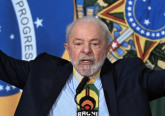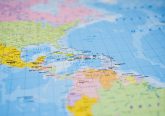 The news of the death of Venezuela’s President, Hugo Chávez, has predictably received divergent responses from the international media. His passing was met with glee by opponents of Chávez – who claim that his presidency was characterised by personalism, economic mismanagement[1] and autocratic leanings – and met with dismay by supporters of the President and the Bolivarian Revolution – who see the potential for the undermining of his legacy, the vast improvements in social indicators, the attempts to socialise the economy and the recovery of a left-wing alternative after thirty years of neoliberalism.
The news of the death of Venezuela’s President, Hugo Chávez, has predictably received divergent responses from the international media. His passing was met with glee by opponents of Chávez – who claim that his presidency was characterised by personalism, economic mismanagement[1] and autocratic leanings – and met with dismay by supporters of the President and the Bolivarian Revolution – who see the potential for the undermining of his legacy, the vast improvements in social indicators, the attempts to socialise the economy and the recovery of a left-wing alternative after thirty years of neoliberalism.
This polarisation of the international media reflects the political polarisation within Venezuela. While sections of the opposition partied in Miami, Chávez’s supporters filled plazas throughout Venezuela on Tuesday night and on Wednesday, thousands marched with the coffin on its journey to lie in state in the Military Academy.
What unites both points of view, though, is an appreciation of the pivotal role of President Chávez in leading the transformation of Venezuela since 1999[2]. The most fundamental question, therefore, has to be whether the Bolivarian Revolution can survive without this key figure.
According to the Venezuelan constitution, after the death of the President, elections have to take place within 30 days. President Chávez, anticipating the possibility of another election when beginning his medical treatment abroad, announced that the candidate for the revolutionaries should be the current vice-president Nicolás Maduro. It is an endorsement that is more or less determining.
But identifying the opposition candidate is slightly more difficult. The opposition in Venezuela is not nearly as cohesive as the name of their coalition implies – the Table for Democratic Unity (MUD in Spanish). The most likely choice is Capriles Radonski, the failed candidate in the October 2012 elections, despite recent rumblings against his leadership from sections of the opposition. Hard-line sections, associated particularly with Maria Corina and Leopoldo Lopez, were disappointed by Capriles’ lukewarm claim in last year’s election campaign that he would continue the “missions”, the social welfare programmes initiated by Chávez, a startling claim given his negative attitude towards these programmes as governor of Miranda state. They were further perturbed by his willingness to shake Maduro’s hand at a meeting of the government with all of the newly elected governors in January, implicitly endorsing the constitutionality of Chávez’s absence in the midst of a rightist campaign pressing the opposition to derecognise the legitimacy of the government.
Ironically, Capriles’ political background stems from this hard-line section of the opposition and was allegedly complicit in the ransacking of the Cuban embassy during the 2002 coup d’etat. Pressure from these links, and his base in one of the most right-wing parts of the opposition, is arguably why he has drifted away from a more pragmatic approach since January. While other possible candidates can be identified[3], the most likely candidate for the right remains Capriles. Despite his failure in 2012, he still has a broader reach across the coalition than the other potential contenders, and the lack of time before the election makes lengthy primaries unlikely.
More interestingly, the opposition can be divided into two camps: those willing to follow the legal path to power – even if they are likely to lose – and those that see a coup d’etat or a campaign of destabilisation as the only solution to their quandary. Since the defeat of Capriles in October last year and failure in all but three of the 23 states in the gubernatorial elections in December, the latter group has gained in prominence. Despite the fiasco of the 2002 coup attempt against Chávez, which ultimately strengthened his government, the danger of another one is by no means far-fetched. Historically, this has been one of the only ways for the Latin American right to overthrow radical socialist presidencies, as in 1973 against Allende. An alternative could be through a campaign of destabilisation with the aim of alienating the electorate from the government, as arguably preceded the election of Chamorro[4] in Nicaragua in 1990.
The immediate likelihood of a successful coup remains relatively remote, although destabilisation attempts are likely. Numerous opposition figures signed a petition expressing support for the armed forces to take control of the country, including the National Assembly member Maria Corina. More recently, there have been alleged sabotage attempts of electric plants, deliberate and politicised hoarding to induce shortages[5], and several US embassy staff have been expelled after being accused of making overtures to the military. Such attempts are likely to continue and even increase if the opposition performs as badly in the upcoming election as current opinion polls suggest. A recent survey shows Maduro defeating Capriles by 14 points[6]. In spite of this, the military seems much more behind the revolution than it was in 2002; in a choreographed move, all of the generals and leading officers of the armed forces announced their support for the government immediately after Maduro announced Chávez’s passing.
The medium term is more ambiguous. There will be great pressure within the Chavista camp to maintain unity. This is likely to hinder debate within the revolutionary forces, which could lead to increasing disillusionment and discontent from less powerful factions of the Bolivarian movement. One of the strengths of Chávez was that he was able to distance himself from the political confrontations within his base. This distance allowed disparate groups to both claim the label of Chavista, while contesting things furiously amongst themselves. For instance, in my research in the struggle for workers’ control in the Venezuelan steel and aluminium industries, I found numerous trade union factions competing while also being strongly pro-Chávez. Maduro is better placed than most leading Chavistas to assume this position, but his links to certain trade union factions over others may undermine this. Moreover, unlike Chávez and his other potential successor, Diosdado Cabello, Maduro does not have a military background and he may find it difficult to continue the civilian-military alliance which has been a central plank of Bolivarianism. A firm bastion of support will likely continue to be the “organised people”, the participants in social movements such as the participatory democratic councils and the recipients of social programmes.
Overall, in the immediate future, the prognosis is favourable to the Bolivarian movement. Maduro is likely to retain the presidency and the opposition is likely to become more demoralised, although also more prone to anti-democratic actions. The medium term is fairly positive too, but at the same time more contingent on the effectiveness with which Maduro can create unity while distancing himself from factional politics.
[1] An good recent debate on the Venezuelan economy that represents both pro- and anti-Chávez positions can be found on al-Jazeera and is between Mark Weisbrot and economist with the Centre for Economic Policy and Research and Arturo Porzecanski, an international finance and Latin American economic analyst http://www.aljazeera.com/programmes/insidestoryamericas/2013/02/201321384852270930.html
[2] He was elected in 1998, but was inaugurated in 1999.
[3] These include the governor of Lara state, Henri Falcon, a former Chavista who sided with the opposition in the 2009 election and was one of only three opposition candidates to be reelected in December 2012. His Chavista past is likely to make him untenable for the more rightist sections of the opposition. Another possible candidate is Ramón Aveledo, the Executive Secretary of the MUD and a member of the COPEI, one of the dominant parties prior to 1999 that it is now widely discredited.
[4] Interestingly Carlos Andrés Pérez, the then president of Venezuela, was impeached in 1993 and put on trial for misappropriating funds to fund her campaign.
[5] Some economists point to price controls as being the cause of the shortages, but shortages have not been the norm since they were introduced and it is notable that they remerged with such vengeance in January.
[6] Election polls in Venezuela are quite politicised, but based on past performance Hinterlaces, the one highlighted here, tends to correspond quite closely to the actual results.





No Comment